Opinion
Achieving food security:Integrated plan necessary
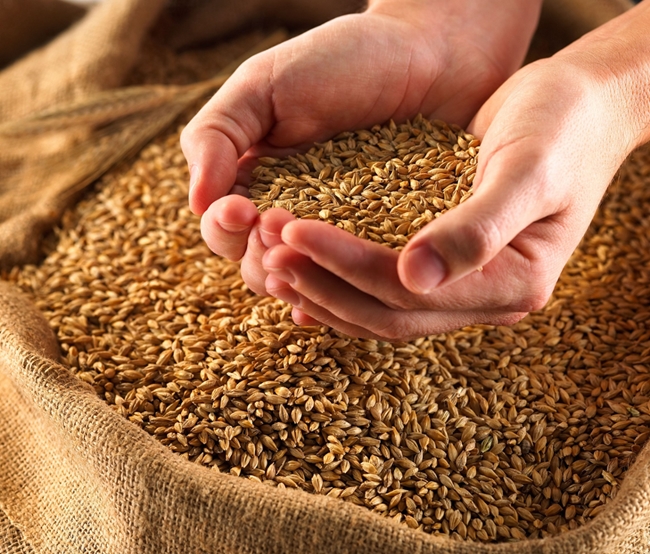
BY Dr. C. S. Weeraratna
csweera@sltnet.lk
According to United Nations’ Committee on World Food Security, “Food security is achieved when all people, at all times, have physical and economic access to sufficient, safe and nutritious food to meet their dietary needs and food preferences for an active and healthy life. The Food and Agriculture Organization (FAO) and World Food Pogramme (WFP) estimate that 6.3 million Sri Lankans are facing moderate to severe acute food insecurity. This could be attributed mainly to shortage of food and high food prices. The latest WFP assessment reveals that 86 percent of families are buying cheaper, less nutritious food, eating less and in some cases skipping meals altogether. This unfortunate situation is the result of many factors among which are poverty, unemployment, decrease in land productivity, scarcity of foreign exchange reserves, depreciation of the local currency, etc. The report further states that the production of maize, mostly used as animal feed, is about 40 percent below the past five-year average, with negative effects on poultry and livestock production. Likewise, the production of vegetables, fruit, and export-oriented crops, such as tea, rubber, coconut, and spices, is well below average, causing a significant decline in households’ income and export revenues. The total cereal import requirement in 2022 is estimated at 2.2 million mt. In the first six months of 2022, more than 930,000 mt of cereals were imported, leaving an outstanding import requirement of 1.27 million mt. Given the persisting macroeconomic challenges, there is a high risk that the remaining import requirement will not be met.
In view of this situation, President of Sri Lanka has launched a programme to ensure food security in the country. The vision of this Food Security Programme is to ensure every citizen has access to enough food at a reasonable price to lead an active and healthy life and to ensure that no citizen of the country should starve due to lack of food and no child should be a victim of malnutrition.
Food Security was not an issue in the past. Even a few years ago we were almost self sufficient in rice. But, the foolish decision of the former President of Sri Lanka Mr. Gotabaya Rajapaksa banning imports of fertilizers such as urea and other agrochemicals affected local production of rice causing us to import rice which has resulted in lowering of food security level. Not only rice production, production of maize, mostly used as animal feed, vegetables, fruit, and export-oriented crops, such as tea, rubber, coconut, and spices, have been affected.
National food insecurity is due to many factors. Among these are wild elephants roaming in some of the dry zone villages causing death to many and destroying crops, Chronic Kidney Disease affecting thousands of farmers in the dry zone, inadequate water supply, lack of reasonable transport facilities, non availability of fertilizers such as urea, and other agrochemicals at correct times, inability to sell the produce at reasonable prices, land degradation etc. House-hold Food Security is closely related to the economy which has deteriorated during the last few years mainly due to drop-in crop production and several other factors. Prices of most food items have been on a steady rise since the last quarter of 2021 and reached a record high in August 2022, with the year-on-year food inflation rate at nearly 94 percent, further limiting the purchasing power of households.
According to Dept. of Census and Statistics around 14.3 % (nearly 3 million) are below poverty level. Unemployment, lack of resource production factors such as land and/or capital are the main factors causing poverty. Ill-health and sickness among family members, addiction to drugs and alcohol, frequently occurring natural disasters such as floods and droughts in some parts of the country, inborn defects such as deformities, blindness, inadequate knowledge on nutrition also tend to affect food security among households.
Land Degradation: One of the important contributory factors for the decline in the productivity of land is Land Degradation. Soil erosion, soil compaction, and nutrition depletion, cause productivity of land to decline, making crop production less profitable. In view of the importance of land degradation, the Ministry of Environment, in 2005, established an expert committee on Land Degradation and mitigating the effects of drought in SL. This committee comprised a number of experts in the field of land management and the main role of the committee was to advice the Ministry of Environment, on issues related to controlling land degradation. At the first national symposium on Land Degradation held in 2010, organized by the Ministry of Environment and the expert committee on Land Degradation, the participants, who were representing many land-related institutions in the country, revealed that a substantial amount of soil/ha/year is lost due to soil erosion. They were of the view that urgent action such as implementation of proper land use planning and the soil conservation and environment act etc. need to be taken by the relevant organizations to control land degradation.
Milk is an important food item for people, especially children. The total annual expenditure on importing milk and other dairy products is around Rs 40 billion. If we are to reduce our trade deficit which is around US. $ 10 billion annually and increase food security, increasing local milk production is important. To increase local milk production, a few years ago, the Government brought down 5000 heifers from New Zealand and Australia. The heifers imported were distributed among middle-scale entrepreneurs in Nuwara Eliya, Matale, Kandy, Kurunegala and Badulla districts. According to newspaper reports the Government had spent Rs. 520,000 per heifer and sold it to farmers at a lower rate of Rs. 200,000. It has been reported that some of the imported cows suffer from Bovine Viral Disease (BVD) and around 200 out of the 5,000 heifers imported to Sri Lanka have died without contributing to local milk production. Simply importing high yielding cattle will not increase milk production, unless they are properly fed and appropriate veterinary services are provided. Cattle imported from countries such as New Zealand and Australia are not acclimatized to local conditions and hence their productivity tends to decline. The farmers complain of insufficient pasturelands to feed the cattle. There is no appropriate programme to cultivate improved pastures such as Brachiaria sp. Napier and CO3. Pasture grasses can be grown under coconut but there was no effective programme to improve pasture production. It is foolish to import cattle to enhance milk production in the country without implementing an integrated programme to upgrade local cattle, making available cattle feed and improving veterinary practices in the country.
There are numerous organization in the country involved in various aspects of food security which is related to several Sustainable Development (SD) Goals. Authorities such as SDG council, Agric. Ministry, Paddy Marketing Board, Institute of Post Harvest Technology, Pulses and Grain Research and Production Authority, Research Institutes etc., need to take cognizance of all these issues and develop an integral plan and implement it if they are keen to achieve Food Security in the country.
Opinion
Learning from global models to address flooding and water shortage in Sri Lanka

by Sudharman Siripala
Sri Lanka is grappling with the increasing threat of climate change, which has led to unpredictable weather patterns. The country faces a dangerous combination of flooding in some regions and water shortages in others, a situation exacerbated by shifting rainfall patterns. Rivers originating in the Central Hills, such as the Mahaweli, Kalu, and Kelani, flow through much of the country, but these water sources are not being distributed evenly. Districts like Monaragala and Hambantota, located in the dry zone, are experiencing severe water shortages. To address this challenge, experts suggest the development of an interconnected river system to harness excess water during floods and redirect it to drier areas, ensuring a year-round water supply for agriculture and daily use.
Global Case Studies in River Management
Several countries facing similar water-related challenges have implemented successful water management systems that Sri Lanka could adapt to its unique circumstances:
The Netherlands – Room for the River Programme
The Netherlands, a country prone to flooding, widened its rivers and relocated dikes to create floodplains. This approach allows rivers to overflow without damaging urban areas, while preserving water flow and natural habitats. Sri Lanka could apply this concept by designating specific riverbank areas for temporary flood storage.
China – South-North Water Transfer Project
China’s massive project channels excess water from the flood-prone Yangtze River to drier northern regions. This system of canals and reservoirs could inspire Sri Lanka to divert water from rivers in the Central Hills to drier areas in the south and east.
Bangladesh – River Interlinking Projects
Bangladesh has implemented river interlinking projects to redistribute water from flood-prone rivers, such as the Brahmaputra, to drier regions. Sri Lanka could link its major rivers like the Mahaweli and Kelani to smaller rivers in water-scarce districts to balance water distribution.
India – National River Linking Project
India’s National River Linking Project connects major rivers to manage both floods and droughts. Sri Lanka could use similar strategies, connecting rivers around the 500-foot contour line in the Central Hills to help distribute water more effectively.
United States – Mississippi River and Tributaries Project
The Mississippi River system combines levees, floodways, and diversion channels to manage flooding. Sri Lanka could adopt similar flood-control measures in vulnerable river basins such as the Kelani and Kalu.
Japan – Underground Reservoirs and Flood Channels
Japan’s G-Cans Project in Tokyo channels excess water into underground reservoirs to prevent urban flooding. A similar underground system could be implemented in Colombo and other flood-prone cities in Sri Lanka.
Singapore – Marina Barrage
Singapore’s Marina Barrage serves as both a flood control measure and a water supply resource. Sri Lanka could develop similar systems to control flooding in urban areas and ensure water availability during dry spells.
Thailand – Chao Phraya River Basin Management
Thailand uses diversion channels in the Chao Phraya River Basin to prevent flooding in Bangkok and direct water to agricultural areas. Sri Lanka could replicate this by creating diversion channels to supply water to its agricultural zones.
Actionable Solutions for Sri Lanka
Develop an Interconnected River System
Establish water diversion channels along the 300-500 meter contour lines of the Central Hills to capture excess rainfall during floods and redirect it to drier areas.
Build Reservoirs and Storage Tanks
Construct reservoirs to store diverted water, ensuring a steady supply for agriculture and domestic use. Sri Lanka has around 14,000 ancient tanks out of 30,000 that could be revitalized for this purpose.
Improve Urban Flood Defenses
Drawing inspiration from Japan and Singapore, build underground reservoirs and flood channels in cities like Colombo to mitigate urban flooding.
Strengthen Watershed Management
Restore natural floodplains and create wetlands to absorb excess rainwater, as seen in the Netherlands, helping to reduce flood risks.
Encourage Public-Private Partnerships
Foster collaboration between the public and private sectors to fund large-scale water management infrastructure, leveraging models from China and the United States.
Leverage Technology
Utilise modern forecasting and real-time water management systems, similar to those in Bangladesh and Thailand, to monitor water levels and manage river flows dynamically.
International Collaboration
Form partnerships with countries that have successfully implemented flood control and water management systems to share expertise and technology.
Sri Lanka’s dual challenges of flooding and water scarcity, compounded by climate change, require immediate action. By developing an interconnected river system and learning from successful global water management models, Sri Lanka can mitigate the effects of floods while ensuring a sustainable water supply for agriculture and daily life. It is crucial for the country to act now, as these solutions have the potential to transform Sri Lanka’s water management system for the better.
Sudharman Siripala Managing Director of Geoinformatics Group and a Registered Licensed Surveyor, specializes in geo-spatial applications. He also serves as a freelance value chain consultant for Vivonta Green Tech Consultants (www.vivonta.lk)
Opinion
Doctor’s plight

Some people have found fault with a female doctor for not coming forward to identify her rapist and help make him pay for his crime.
Do they not realise the emotional toll of facing her rapist again?
There should be a way for survivors to testify directly to the judge without enduring such distressing encounters. Making a victim relive her trauma in this manner is akin to subjecting her to the ordeal all over again.
A Ratnayake
Opinion
Developing attitudes of schoolchildren for development
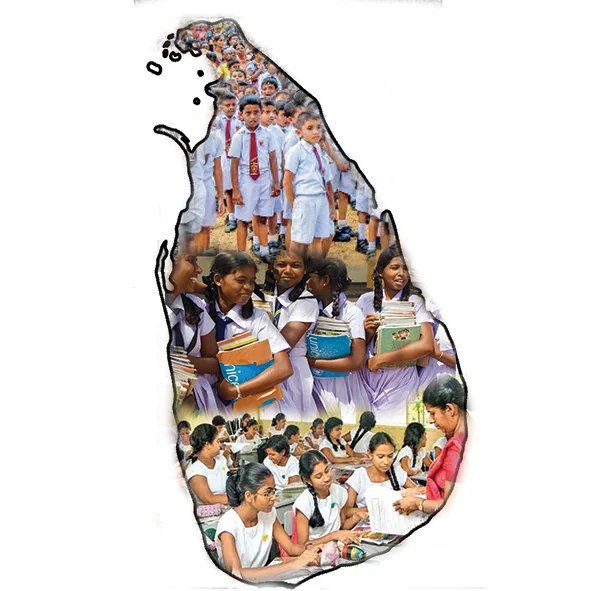
Sri Lanka was once at an economically comparable level with some of the world’s most developed countries in the 19th century. However, despite our country’s potential, we are still striving to fully develop. Many people often blame politicians, government officers, or various sectors for the situation. However, I believe the root cause of these issues lies not in any individual or group, but in the lack of good attitudes within our society.
We are investing significant resources into our education system, which is funded by the taxes of hard- working citizens. However, when we examine the outcomes, we realise that the academic achievements of our graduates alone are not enough. There are instances where professionals, despite having the necessary qualifications, fail to uphold ethical standards. In some cases, this even results in malpractice or harmful actions that damage our country’s reputation and progress. This highlights the gap between academic success and real-world responsibilities.
The education system, which is currently focused on competitive exams and rote learning, does not emphasise the development of attitudes and character in students. While our students are academically capable, many lack the qualities required to contribute positively to society. This lack of focus on social values, such as patriotism, selflessness and respect for elders, is holding us back from achieving the level of progress we deserve.
To address these concerns, I wrote to His Excellency, the President of Sri Lanka, on 24th September 2024, proposing education reforms that emphasise not only academic qualifications but also attitudes, ethics, and social responsibility. I suggested a holistic approach to university admissions and government recruitment, incorporating moral integrity, character, and extracurricular involvement, key traits for fostering well- rounded, responsible citizens. More importantly, I strongly recommended introducing a compulsory school subject, with both theory and practical components, focused on attitude development, which would be evaluated in university admissions. Encouraging extracurricular participation alongside academics will help shape ethical and socially responsible individuals.
I am pleased to inform you that the President, recognising the importance of these reforms, has directed the relevant ministries (by a letter dated 24th October 2024) to explore integrating these ideas into the education system. This marks a crucial step in transforming the values and attitudes of our youth for the nation’s benefit.
However, meaningful change requires collective effort. Parents, teachers, students, and citizens all play a role in shaping Sri Lanka’s future. Together, we must instill responsibility, ethics, and patriotism in the next generation. I invite you to share your thoughts and suggestions on further enhancing the values and attitudes of our youth. Your feedback will be invaluable in building a brighter future for Sri Lanka, one driven not just by knowledge, but by integrity and character.
Dr. Mahesh Premarathna
Research Fellow, National Institute of Fundamental Studies, Sri Lanka Email: mahesh.pr@nifs.ac.lk
-

 News6 days ago
News6 days agoSeniors welcome three percent increase in deposit rates
-

 Features6 days ago
Features6 days agoThe US, Israel, Palestine, and Mahmoud Khalil
-
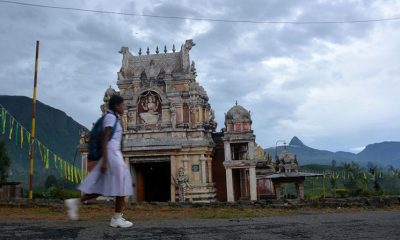
 News6 days ago
News6 days agoScholarships for children of estate workers now open
-
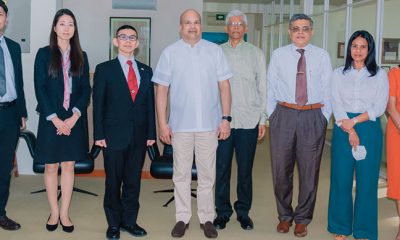
 News7 days ago
News7 days agoDefence Ministry of Japan Delegation visits Pathfinder Foundation
-
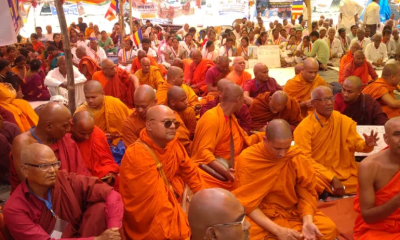
 Foreign News4 days ago
Foreign News4 days agoBuddhism’s holiest site erupts in protests over Hindu ‘control’ of shrine
-
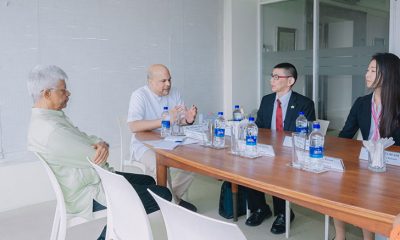
 News6 days ago
News6 days agoJapanese Defence Delegation visits Pathfinder
-

 Editorial7 days ago
Editorial7 days agoWhen promises boomerang
-

 Features3 days ago
Features3 days agoCelebrating 25 Years of Excellence: The Silver Jubilee of SLIIT – PART I











